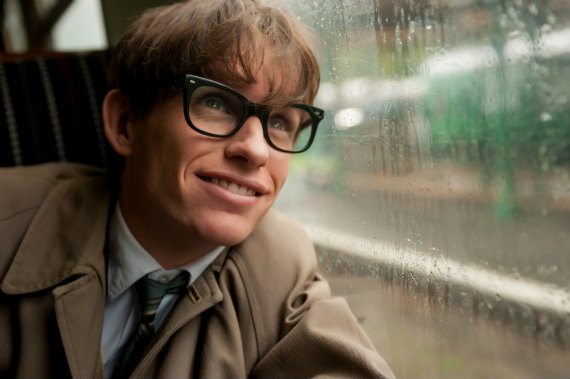The Theory of Everything
Director: James Marsh
Cast: Eddie Redmayne, Felicity Jones
Length: 123 minutes
Country: UK
The Theory of Everything, the semi-autobiographical film inspired by Jane Hawking’s biography, documents the relationship between her (played by Felicity Jones) and her husband Stephen Hawking (Eddie Redmayne) is what an American journalist will inevitably at some point tag as ‘a quintessentially British movie’. This definition is possibly simultaneously the film’s greatest strength and greatest failure. The difference lies on what the audience is expecting to watch: if you are coming to see an against-all-odds narrative with an emotive piano score paired with beautiful cinematography, then you will not be disappointed. However, anyone with a genuine curiosity regarding the life of the world’s greatest cosmologist will feel that they have been presented with a pretty puff of smoke, rather than a concrete product.
The reason this divide feels so evident is due to the story of Stephen and Jane, which is both heart-breaking and uplifting, painful and invigorating, full of love and mess. Hawking, diagnosed with motor neurone disease at 21, has publicly lead an incredibly successful and influential life set against a private backdrop of complication and tragedy. The Theory of Everything is most concerned with this personal history, exploring the effect of the double-edged sword of Stephen’s genius and disability on his devoted wife, Jane. This in itself is no fault, but an issue occurs when Stephen’s breakthroughs as a theoretical physicist become majorly side-lined in favour of the struggle Jane faces as a partner and carer. It feels as if the producers are one step away from writing ‘this is no ordinary love story’ on the films promotional material, which already pitches the film as a visually stunning production with two beautiful and very promising young British cast members.
It is a real shame that The Theory of Everything works at this angle, because the story of the real life Hawking couple is so much more than an unconventional love story. It is largely uncharted territory: two incredibly intelligent individuals who together attempt to re-evaluate their futures in the face of incurable illness and an ever-shifting predicted life-span, all whilst dealing with never-ending public attention, comment and approval. Stephen’s scientific breakthroughs are acknowledged and occasionally briefly explained through use of food at the dinner table, but it feels as if the film is worried that the audience will be alienated by all the science. Instead, it literally opts to present important theories in the form of chopped-vegetables, easy to digest but equally easy to discard. It is largely a sense of intelligence that we are missing; some of the most fruitful scenes are in the opening third of the film, where we get to witness a young, promising Hawking at Cambridge, rapt in his education. Whilst the audience cannot engage in all that is being taught, we can engage in Stephen’s own passion regarding his subject, and it is a pity that this is disregarded further on in the film.
The real life Hawking couple is so much more than an unconventional love story. It is largely uncharted territory: two incredibly intelligent individuals who together attempt to re-evaluate their futures in the face of incurable illness and an ever-shifting predicted life-span, all whilst dealing with never-ending public attention, comment and approval.
Whilst the film is nowhere near as intelligent as it should be, it is still undeniably beautiful and emotive. Eddie Redmayne’s performance is flawless. An outstanding effort is made to accurately chart his physical and vocal decline, to the point where it becomes hard to remember that Redmayne himself is an actor with full capacity of his body. An Oscar-nomination nod is practically guaranteed at this point, with only Redmayne’s young age and the oncoming threat of Benedict Cumberbatch in another real-life biopic, The Imitation Game, to hold him back from the award.
Felicity Jones is also revealing herself as a tremendous actor, now that she has finally outgrown the child-like face which has plagued her casting opportunities for years. Her only weakness is perhaps that Jane Hawking is just too perfect – whilst Jones brings as much depth to the role as possible, she is constrained by a screenplay which presents Hawking’s dedicated wife as a ‘so-good-it-almost-becomes-irritating’ partner.
Overall, The Theory of Everything encapsulates much that is especially valued in British cinema: aesthetically stunning landscapes and cinematography, the breadth of upcoming British acting talent, and a no-nonsense approach to immense pain and difficulty. However, given the incredible intellect of its subjects, it is disappointing that it fails to grant anywhere near the same level of intellect to its audience. A pretty film which makes one take a moment to appreciate the basic ease of their own lives, but ultimately lacking in any risk-taking or creative punch.
Image Source: UPI Media


Comments